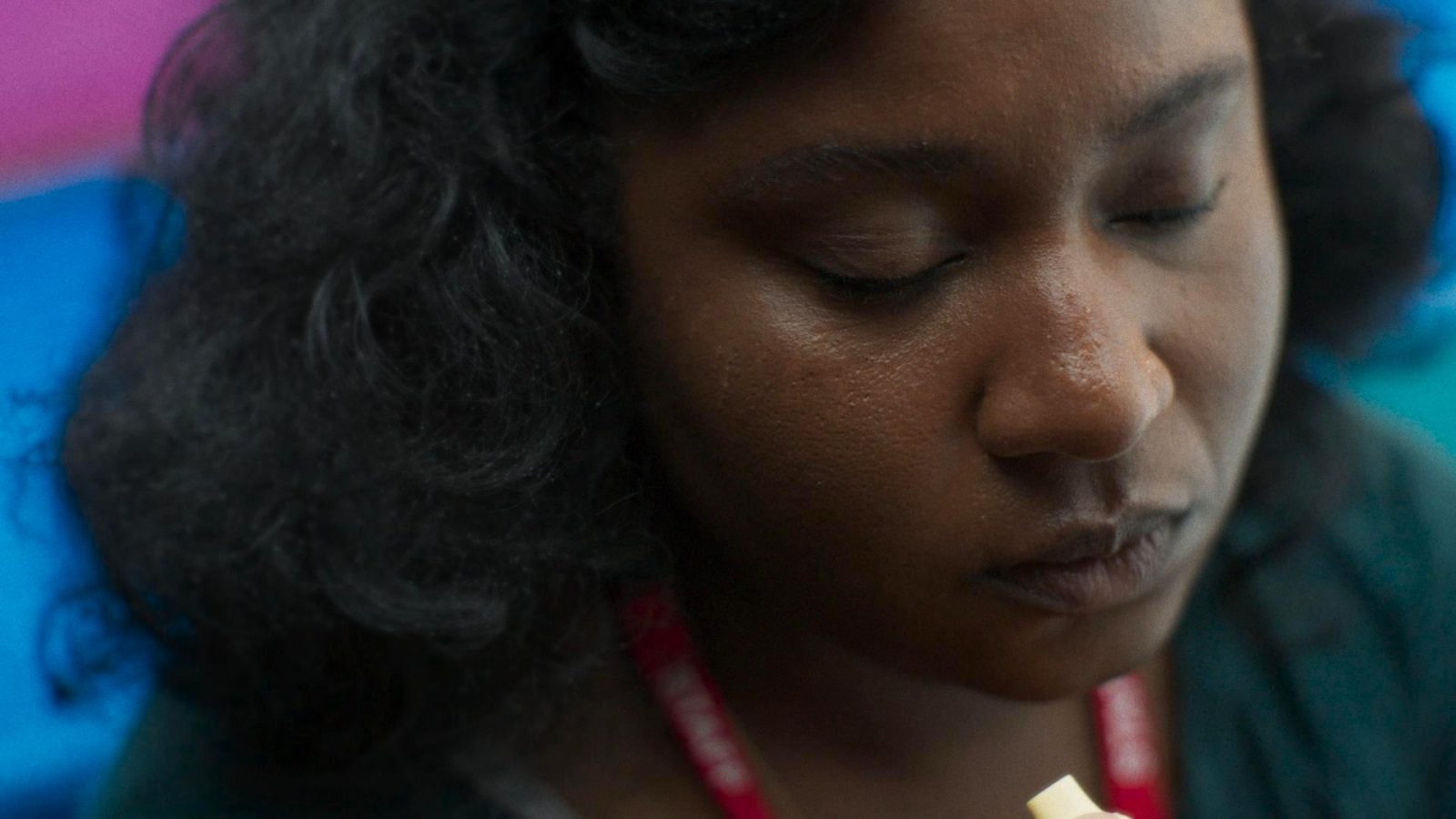Dark Skin Bruises Differently achieves a density of meaning that suggests the potential for expansion into a feature-length work. In any case, there’s something powerful about its current form: a sharp, focused intervention that refuses to overstay its welcome or dilute its message.
By Jerry Chiemeke
How do you protect a child when the very system designed to safeguard her is the one writing her off? What does it mean when educators tasked with nurturing young minds are the first to dismiss them?
With her directorial debut, British-Nigerian actress Susan Wokoma, known for her roles in Cheaters (2022-2024), Enola Holmes (2020-2022), and The Ghost And The House Of Truth (2019), confronts these questions with an urgency that refuses to soften its edges for comfort. In the taut confines of eleven minutes, Dark Skin Bruises Differently (2025) operates as both a damning indictment and a mirror held up to the British educational system’s treatment of Black children.
Wokoma also stars as Sarah Lawson, a Black teacher at Gloucester Park Primary. The story pivots around Maria Obasi (Moizelle Olaleye), a young Black student whose struggles are dismissed by her predominantly white teaching staff (portrayed by Charlotte Randle, Zainab Hasan, Leo Bill, and Rebecca Callard). Their preferred narrative? That Maria is troubled, and she comes from a difficult home where her mother struggles with mental health issues.

Wokoma structures this film around two pivotal scenes that expose the machinery of systemic neglect. In the first, Sarah Lawson pushes back against her colleagues’ collective dismissal of Maria’s injuries. The teachers defer to a Social Services report that deems Maria’s account of bodily harm to be false. They cite her alleged history of lying, her supposed delinquency, and a recent theft. Each accusation layers upon the next, constructing a narrative that absolves them of responsibility.
The second scene cuts deeper. Sarah asks Maria to read her own school report, a document that brands the child an “habitual liar”, “problematic”, and “untrustworthy”. Olaleye, who delivers minimal dialogue throughout the film, conveys the full weight of internalised stigma through downcast eyes and a withdrawn posture. Cinematographer Ben Cotgrove captures this deflation with intimate precision, his lens lingering on the small gestures that signal a child already learning to believe the worst about herself. It is a performance of quiet devastation.
What makes Dark Skin Bruises Differently particularly incisive is its refusal to offer catharsis. There’s no moment of triumph, no suggestion that Sarah’s intervention will alter Maria’s trajectory. Sarah Lawson wants to save a child who looks like her, but the film acknowledges the limits of individual intervention against institutional inertia.
When she pushes back against her colleagues’ assumptions – questioning whether social services actually spoke to Maria herself, challenging the rush to label the child “delinquent” – her efforts feel less like heroism and more like futile resistance against a tide that has already turned. By denying audiences the comfort of a redemptive arc, Wokoma forces us to sit with the reality that for many Black children in British schools, there is no third act rescue, no deus ex machina intervention.

The film’s title itself operates on multiple levels. Beyond the literal medical fallacy it references, it speaks to how Black pain is rendered invisible or illegible within established institutional frameworks: bruises that don’t show up on assessment forms, trauma that doesn’t register in staff meetings, abuse that becomes deniable when the victim’s credibility has been preemptively destroyed.
Wokoma’s directorial choices amplify this sense of enclosure and futility. The school setting, ostensibly a place of learning and growth, becomes a site of surveillance and judgment, where Black children are profiled before they’ve had a chance to define themselves. The vicious cycle is laid bare: preconceived notions calcify into fact, and children are written off before the assembly bells ring.
Dark Skin Bruises Differently operates as both narrative and public service announcement, challenging those entrusted with the care of society’s most vulnerable to interrogate their own complicity. It asks: What does it mean when your very skin obscures your suffering in the eyes of those meant to protect you? How do you survive a system that has decided who you are before you’ve had the chance to become?

If there’s a limitation to Wokoma’s approach, it is that her film’s brevity occasionally works against its ambitions. The compressed runtime means that certain dynamics, particularly the relationship between Sarah and Maria, remain sketched rather than fully developed. Yet this also generates urgency, suggesting that there’s no time for elaborate character development when children are being failed in real-time.
Dark Skin Bruises Differently achieves a density of meaning that suggests the potential for expansion into a feature-length work. In any case, there’s something powerful about its current form: a sharp, focused intervention that refuses to overstay its welcome or dilute its message. Wokoma has created a film that operates like testimony in a trial the system refuses to hold, evidence for an indictment that may never be formally filed but whose truth remains undeniable.
Dark Skin Bruises Differently is screening at this year’s BFI London Film Festival.
Jerry Chiemeke is a Nigerian-born writer, film critic, journalist, and lawyer based in the United Kingdom. His writing has appeared in Die Welt, The I Paper, The Africa Report, The British Blacklist, Berlinale Press, The Johannesburg Review of Books, Culture Custodian, Olongo Africa, and elsewhere. Chiemeke’s work has won or been nominated for the Pushcart Prize, Ken Saro Wiwa Prize, Diana Woods Memorial Award for Creative Nonfiction, Best Small Fictions, and the Quramo Writers Prize. He is the author of the critically-acclaimed short story collection, Dreaming of Ways to Understand You.




